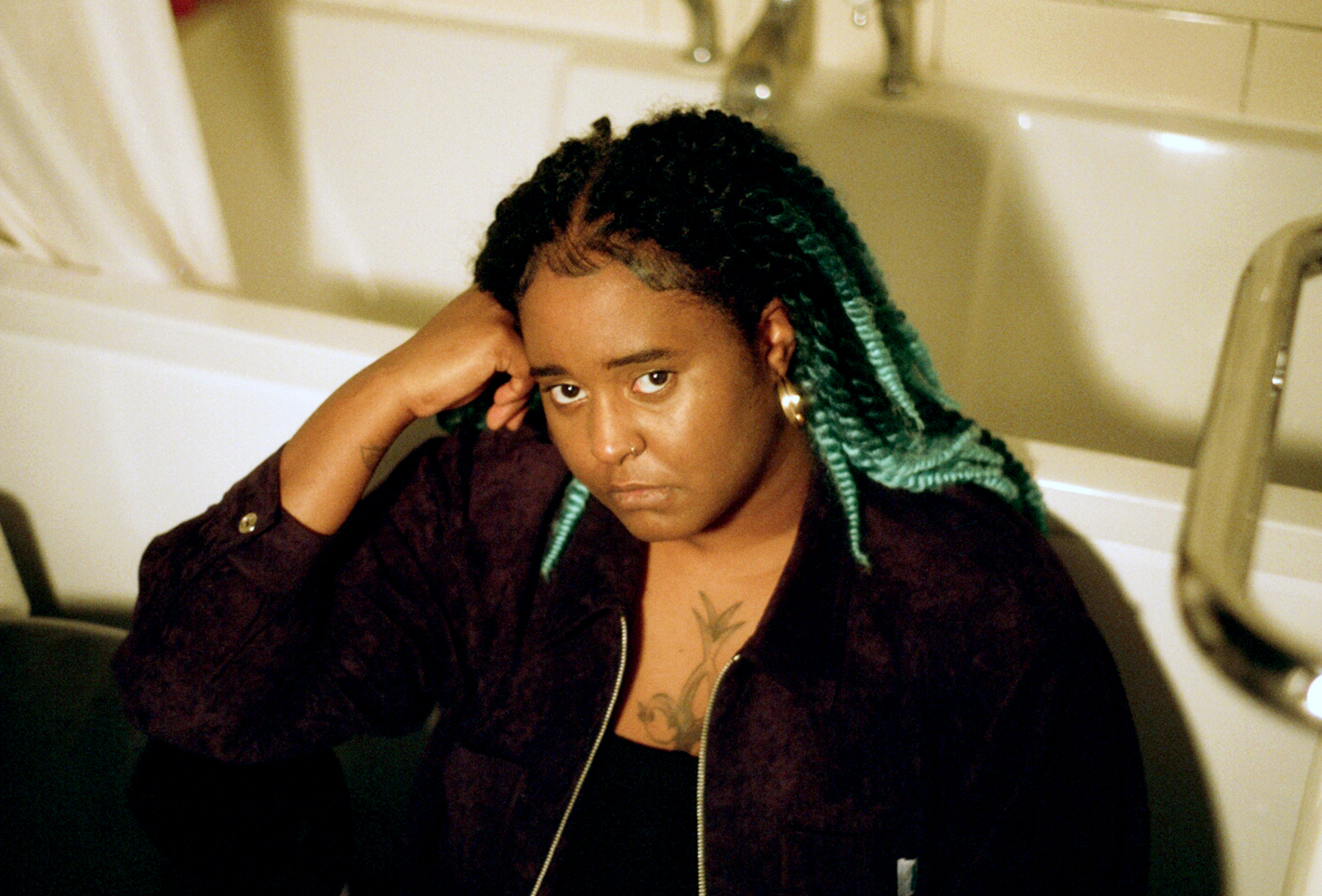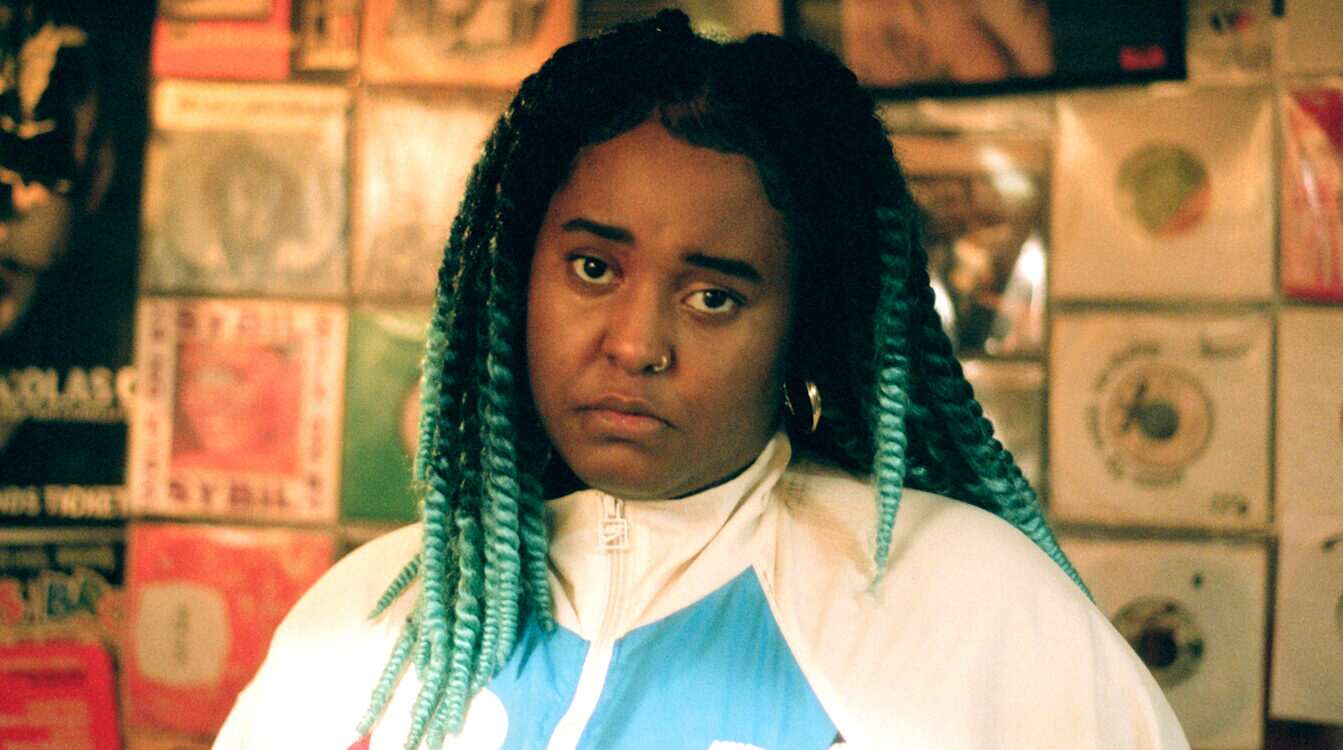A vanilla Mini Milk melting…
A porcelain plate smashing into hundreds of pieces…
A bowl of burning marshmallows…
Powerful, moving art that counted down to the release of a song titled ‘Mini Milk’, by Hackney-based music collective GRAMN., which came out on Friday 31 July.
It’s an important addition to current conversations about racism and the Black Lives Matter movement – it’s about what it really takes to be a white ally to black people, it will serve as a soulful spoonful of sugar to help the much-needed medicine go down.

Tackling trauma in song
Along with James Lowe and Johnny Tomlinson, GRAMN. is fronted by Aux, “Aux is short for auxiliary, as in auxiliary cord,” she tells me. “Which is the standard cord to connect a speaker to a device in order to play music. I’m the plug basically, and I’m awkward as fuck. So it serves as a double meaning.”
She is a woman unafraid of speaking her own truths. She tackles trauma in her lyrics, which are honest, powerful and raw. And she doesn’t care if they make you feel uncomfortable. As she’s been made to feel “other” her entire life.
“Mini Milk is a confrontation on white fragility and white privilege. It’s a discussion about those who are happy to perform but are not willing to do the work, unwilling to unlearn or relearn things. It’s confrontational,” says Aux with unfiltered passion, when explaining what Mini Milk is about.
“The words are saying that, since I’ve been around you, I’ve got dodgy vibes, you lot are saying one thing and doing another thing. You can’t put on your nice dress and your face mask and go to a Black Lives Matter protest just to take a picture, then go to Starbucks for an iced latte and watch people get pepper-sprayed violently in the street. If you do that, you’re not actually doing the work. It’s infuriating.”
You can’t put on your nice dress and your face mask and go to a Black Lives Matter protest just to take a picture, then go to Starbucks for an iced latte and watch people get pepper-sprayed violently in the street.
Born in Homerton Hospital in east London, Aux – who’s now in her 20s – had what she describes as a “disjointed” childhood. “I lived with my mum for the early parts of my life until I was around four.” she tells me, “then I started living with my nan, along with my siblings too. I didn’t know at the time but it was because my mum was ill. When my dad died when I was eight, we moved back home with my mum, it’s a long story but then the family dynamic disintegrated.”
When she was just 11 years old, she became a carer for her mum. “I was responsible for making sure the bills got paid, picking up mum’s medication, doing the shopping,” she explains. “Some days, I didn’t go to school because I was mentally exhausted. I managed to get good grades, despite everything.”
Life got hard and complicated. “I ran into a bit of social trouble,” says Aux, with a deep chuckle. “And I didn’t start making music until I was 16. My mum was like if you wanna live here and you don’t work, you need to be in education. So, I went to the British Academy of New Music. My sister was like you know you can sing, you should audition. I grew up in a musical family, a lot of talented people. I felt comparatively, that I wasn’t good enough.” But Aux’ talent was undeniable, even though she brushes it off, and she was accepted at her audition.
She’s been compared to the likes of classic soul star Angie Stone, and now that GRAMN have collaborated with Kemi Ade and Jerome Thomas on Mini Milk, there’s definite contemporary vibes reminiscent of Kendrick Lamar and Kano.
Singing is therapy
Although politics are at the core of what she’s all about, Aux can’t make music or sing when she’s sad. “I am more of a reflective writer, I write about it after. It’s like talking therapy, I vent, I speak about what’s happened,” she explains. “I need space and time to process.” And that reflection is infused into Mini Milk, which has a soulful sound, with a sort of DIY approach – it was recorded during lockdown.
Aux talks openly about the racism she’s faced for her entire life. “No one cares that my nan is white and my mum is mixed race. I am black,” she says, and continues to tell me about how many times people have touched her hair without her permission. “You know like when people see cute dogs on the street. People I have never met being like, ‘Oh my god your hair’s so nice’. And you can see their hand reaching for your face, like a toddler’s, and you know what’s about to happen. And then you still try to come across as not being rude. When I should be like, take your hand away from my fucking face.”
To support her family and her music, Aux has worked in hospitality since she was a teenager. She’s faced workplace racism and a boss who casually called her “Shanniqua”. “He’d be like alright Sheniqua, just chill out,” she tells me. That same manager is also someone who has blacked up for Halloween. “He wore an Afro wig and posted it to his Facebook. […] We have to choose between our dignity and our bills, putting food on our tables and paying rent,” she says, matter of factly.
I’m even scared to have a baby, the way that black women die in maternity wards is terrifying.
“I’m even scared to have a baby, the way that black women die in maternity wards is terrifying,” Aux says with heartbreaking openness – referencing the appalling fact that black British women are five times more likely to die in pregnancy or childbirth. “Women dying from things that shouldn’t be happening in 2020.”
This anger and trauma are apparent as Aux sings. You can feel it. “It’s dark and gritty and real,” she says. “I try to sing how I talk.”
And as she puts it in ‘Mini Milk’, “it just ain’t enough…”
‘Mini Milk’ is out now, listen here.









